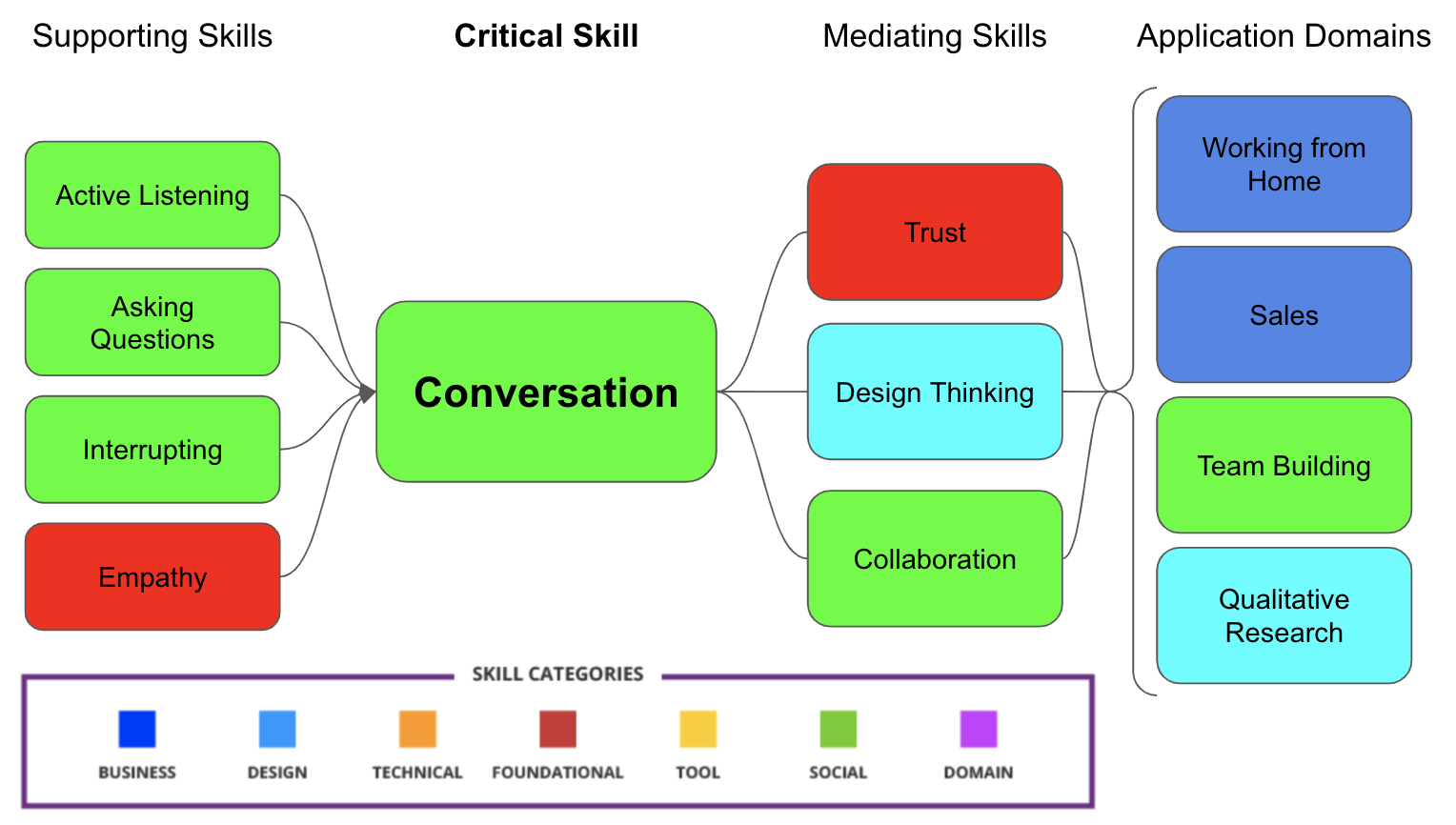Critical skills for the future of work - conversation
Steven Forth is co-founder and managing partner at Ibbaka. See his skill profile here.
Many of us have been working from home for the past three months. In our research Mobilizing Talent After Disruption two of the questions we asked were
What are three of your own skills that have helped you personally navigate the COVID 19 crisis?
and
What new skills are people on your team using during the COVID 19 crisis?
The answers to the first question tended to be introspective. People talked about ‘self reflection’ and ‘caring’ and ‘patience.’ The answers to the second question were more practical. ‘Collaboration’ came up, as did the names of a number of virtual work platforms such as Slack, MS Teams and Zoom.
There were two skills that turned up on both lists: ‘trust’ and ‘conversations.’
In interviews with people about their experiences during the pandemic we asked “How do you build trust?” Some of the answers included
By open and honest conversations
By talking to each other
By telling each other what we really feel and what we really fear
At Ibbaka Market, we have also been asking people how they are responding to the pandemic. One piece of advice that many people are sharing is
“Now is not the time to sell, it is more important to build relationships, one does that through conversations.
Conversations. They are central to how we work these days. In the famous early book on digital marketing, The Cluetrain Manifesto, it was even claimed that “markets are conversations.” Conversations have become a critical skill.
How do we get good at having conversations?
The first thing is to begin with listening. If you can’t listen to the other person, it is hard to have a conversation. Sometimes conversations erupt spontaneously and it is great when that happens. Other times they need some support and guidance. Asking questions is a critical part of conversations. Conversation is a two way street, and you need to get your own point of view across, and not just listen and ask questions. Knowing how, and when, to interrupt is also an important conversation skill.
Skills become meaningful when they are connected to other skills and how they are applied. At Ibbaka we refer to this as the skill graph (this is a real thing, living in an RDF database, and it includes more than skills, people, teams, jobs and roles are all part of the skill graph). A snippet of the skill graph for the Social Skill of Conversation is shown below.
One of the interesting things about the conversations that are emerging today is that they are increasingly distributed and extended.
This is not new of course. Writers, artists and philosophers have though this way for many centuries, seeing their work as a conversation across space and time, that began before them and will continue after them. But iit in something that is amplified by the Internet and is being encouraged by our experience of physical and social isolation during the pandemic.
Conversations are distributed when they take place across distance and between parties that may not all be connected to each other. They are extended in that they can take place over time and across multiple media. These extended and distributed conversations are becoming central to how we make sense of the world and co-ordinate our activities. They are a new form of critical skill, one that supports other important skills like networking.
You may be asking “What are critical skills?” We have asked ourselves the same question. And we have tried to answer it here What are critical skills anyway? and here What are the critical skills for the future of work?
Our preliminary answer to this question is that
“Critical skills are the intersection of foundational and core skills. In general, critical skills are future looking, they are the skills we will be using in the future, not the skills we used in the past. They are the skills that connect other skills, give them meaning and help you to apply skills to work.
Ibbaka posts on critical skills
Critical Skills for 2022 - First Impressions of Survey Results
Critical Skills - Generative Thinking (Interview with GK VanPatter)
Critical Skills for the Future of Work - Conversation (this post)
Critical Skills for the Future of Work - Managing Trade Offs
Critical Skills for the Future of Work - What are the Critical Skills?










